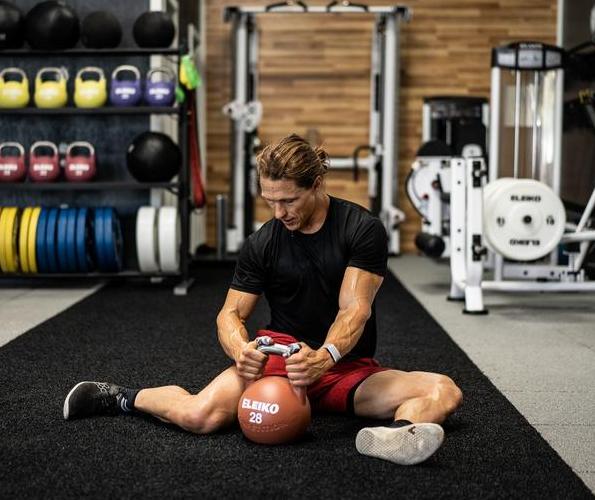Feeling a little fatigued in training? What could it be? Your sleep, nutrition, and stress catching up? Or have you been pushing it too hard in training and it’s time for a deload week?
If you’ve been in Persist for more than a few weeks, you may be feeling a hit of intensity right now. And you may also feel the limits of pushing it hard in the gym.
Here’s everything you need to know about backing off the gas pedal so you leave energy in the tank for later. In other words, how to keep making progress in the long term by giving your body a chance to recover and heal.

What is a Deload Week?
Progressive Overload
The systematic approach to pushing your training in some measurable way each week beyond what you did in the previous week. This can be in the form of volume (sets and reps) or intensity (weight or increased fatigue).
I define it as a purposeful break from progressive overload. This can be a a couple of days or a couple of weeks where we reduce our training intensity and/or volume. We do this to allow our recovery systems a chance to heal our body. This is a time for the nervous system to recover, our joints and muscles to feel better, for our drive to train to reignite, and to feel better.
We all require a deload at some point if we are pushing progressive overload principles. It doesn’t always happen on the same schedule for different people, or even for the same person. You might need one every 6 weeks, but then randomly you need one after 4 weeks because life got crazy.
Training Stress vs. Movement
Training is not the same as movement or simple exercises. Exercising and moving is more about burning calories and offsetting how much you consume from food with how much you expend in a day. Training, on the other hand, is a system of principles. We take those principles to the gym with the goal of challenging your physiology to change and adapt.
You should move every single day of your life. Be less stagnant. Sit less and refuse to follow he sedentary lifestyle that is so pervasive in our culture.
Training, however, doesn’t happen every day. Rather it should take place 2-6x per week with the distinct goal and purpose of stressing your body to change. And if that is the goal, then the best methods to stressing the body to change should entail progressive overload. Do just a little bit more than last time in some objective and measurable way.
When Will You Hit the Wall?
As we progress week after week, there eventually comes a time when you stop seeing progress at the same rate. The weights can’t go up as quickly, the reps can’t increase week after week, and you don’t see your times come down. This might happen for you every 6 weeks, 4 weeks, or 3 months. But what dictates the time you can spend in a progressive overload cycle?
- Training Age – less trained (beginners) can progress for longer without seeing a stall in their progress
- Training Intensity – less relative intensity each day and you can progress for longer, albeit slower
- Recovery – how well you are recovering outside of the gym with Sleep, Hydration, and other recovery practices such as sauna, cold plunge, and relaxation.
- Nutrition – how are you fueling your body before, during, and after training.

You can train with more intensity, but you will need to nourish and recover better in order to avoid a quick runway to your next plateau. But regardless of what your specific combination of the above variables looks like, you will reach a limit. Even the most optimized recovery and nutrition practices, with enough progressive overload, will eventually result in a plateau. Just think of it this way, you can’t keep adding 5lbs to the bar forever.
Do I Really Need a Deload?
You might then say, “but if I just keep my intensity down and eat well and recover well, then I’ll never hit that plateau state.” You might be right, but then you also won’t be making measurable progress. You’ll just be maintaining. Which is another way of saying you are going to slowly decline with age related muscle loss.
So plateaus should not be avoided. They should be welcomed. They are a sign you are growing, getting better, and pushing your intensity/recovery balance threshold. We call this over reaching and it is essential as part of the training process to get your best results. You shouldn’t shy away from it, but simply know the signs of when you are starting to hit this zone. Because just on the other side of over reaching is something called overtraining, and the recovery from that phase is a little harder.
When we hit the over reaching phase in an effort to see the best results, we can hang here for a week or two before we need to reset. The term we use for resetting is called a Deload.
Signs It’s Time for a Deload Week
Other than stalled training progress, here are some other signs that indicate a deload may be in order:
- Increased soreness, pain, or fatigue
- Nagging injuries creeping up
- Insomnia or trouble sleeping well
- Appetite swings and cravings
- Decreased motivation and feelings of burnout
What If I Feel Fine?
After every two 6-week training cycles in Persist, we have a Bridge week to deload before the next training block starts. But what if you just started Persist and your fire is lit and ready to go?
Ideally, you learn about yourself and how we train inside PERSIST to get these weeks to line up with each and every training cycle. You use our guided program to build up your intensity over 6 weeks. The last two weeks typically push your threshold into the over reaching state to get the most out of the training block. Then when it is time to start a new training cycle, you dial things back in Week 1. You allow your body to reset, recharge, and feel ready to build for yet another 6 weeks.
Of the thousands of PERSIST participants, does everyone fall neatly into this schedule? Definitely not.
- Some people join mid training cycle and don’t follow this curve
- Others get overly ambitious and push it very hard in the first 2 weeks of a training cycle finding that in week 4 or 5 they are tapped out.
- A certain number don’t challenge themselves sufficiently within a 6 week cycle and finish week 6 still feel chipper and refreshed
- Some people have unexpected life circumstances pop up that add stress to their plate and cause their training to feel like over reaching earlier than normal.
Whenever you hit this point in your training, be it at week 6 or week 3 of your training, it is important to know how to help turn things around.
Deload On Your Schedule With Autoregulation
I’ve learned that no matter how perfect the program is laid out and no matter the intentions, real life is another story. It is always possible for a client to attack it in a different way and push it too hard when we are supposed to be taking it easier. Or take it too easy on a week we are supposed to be pushing it hard. Furthermore, how a client feels in a given week may not align with what we are looking to do. Someone might be under slept in week 6 and in no condition to hit a PR.
Despite the PROGRAMMING being set up in a way to foster great progressive overload with periodic deloads, the client will need to AUTO REGULATE in order to avoid over reaching or taking it too easy.
Auto regulation means adjust training variables based on how you feel day to day. This is a result of training-induced fitness and fatigue, together with all the other stressors in your life. (Including sleep, poor nutrition, work and family pressures, and much more.)
Know the Why In Your Training
Becoming a thinking athlete is something we believe in deeply at FBB. Knowing why you are doing what you are doing is key to getting the best results. Part of this knowledge is understanding how our program is built, laid out week by week, and the theoretical progression of the training.
Over time with more knowledge you ideally will be able to AUTO REGULATE yourself more and more to fit nicely into the 6 week progressive overload cycles that we follow. If at any point you aren’t fitting perfectly into this timeline, don’t worry. You can still make great progress or maintain through turbulent times in your life. If you desire to know how to optimize this more for yourself then please reach out to our support team. We can guide you or connect you with a coach to customize this journey for you.
Built In Deload With Persist
Persist takes the guessing out of when to push and when to pull back. Try a free two week trial for four tracks of training, plus bonus ebooks.
Sample Deload Week
In Persist the Deload week always reflects where we are in the training cycle and the year. But if you’re curious what a typical deload week looks like with Functional Bodybuilding, you can download a sample from a previous training cycle here.
